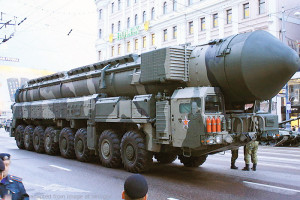Russia to Increase Military Spending While Slashing Welfare Budget

(Moscow Times – themoscowtimes.com – October 4, 2016)
Russia’s military spending is set to increase by 679 billion rubles ($10 billion) despite the welfare budget decreasing by 375 billion rubles ($6 billion), the Gazeta.ru news website reported Tuesday, citing a source in the government.
The government’s finance ministry published a bill of amendments to the welfare budget on Monday, announcing that it will shrink from 13.1 trillion ($210 billion) to 12.7 trillion ($203 billion dollars). This spending cut already includes the government’s decision to give pensioners a one off payment of 5,000 rubles instead of indexing pensions at the rate of inflation.
However, the bill also outlines a 304 billion ruble ($4.8 billion) increase in the overall state budget, rising from 16.1 trillion rubles ($258 billion) to 16.4 trillion ($263 billion), meaning the government has freed up 678 billion rubles ($10 billion).
An unnamed government source familiar with the bill told Gazeta.ru that the increase relates to the repayment of state credit, previously guaranteed by the government for the fulfillment of state defense contracts.
This, according to the source, is how the finance ministry will “be able to reduce the burden of defense spending on the 2017-2019 budgets.”
Alexandra Suslina, an economic analyst, told Gazeta.ru that defense and social spending are the government’s priorities. All other areas of government would receive “whatever is leftover,” she said, adding that the economy was far from the government’s priority.
“They don’t even pretend it is,” she said.
According to the expert, investment in long-term projects is unlikely due to “high political risks,” whilst adding that the two choices the government faced to increase the budget were printing money or raising taxes.
Gazeta.ru also claims to have seen a proposed bill of amendments to Russia’s budgetary code, which would give the finance ministry the right to redistribute 10 percent of the entire budget to institutions of state security, namely; defense, foreign affairs, internal security, and the recently formed national guard.
The bill’s accompanying material explains the need for the budgetary mechanism as “the ever increasing consequences of the changing geopolitical situation around Russia.”
